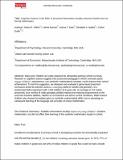| dc.contributor.author | Dillon, Moira R. | |
| dc.contributor.author | Kannan, Harini | |
| dc.contributor.author | Spelke, Elizabeth S. | |
| dc.contributor.author | Dean, Joshua Thomas | |
| dc.contributor.author | Duflo, Esther | |
| dc.date.accessioned | 2018-04-12T15:06:24Z | |
| dc.date.available | 2018-04-12T15:06:24Z | |
| dc.date.issued | 2017-07 | |
| dc.date.submitted | 2016-12 | |
| dc.identifier.issn | 0036-8075 | |
| dc.identifier.issn | 1095-9203 | |
| dc.identifier.uri | http://hdl.handle.net/1721.1/114666 | |
| dc.description.abstract | Many poor children are underprepared for demanding primary school curricula. Research in cognitive science suggests that school achievement could be improved by preschool pedagogy in which numerate adults engage children’s spontaneous, nonsymbolic mathematical concepts. To test this suggestion, we designed and evaluated a game-based preschool curriculum intended to exercise children’s emerging skills in number and geometry. In a randomized field experiment with 1540 children (average age 4.9 years) in 214 Indian preschools, 4 months of math game play yielded marked and enduring improvement on the exercised intuitive abilities, relative to no-treatment and active control conditions. Math-trained children also showed immediate gains on symbolic mathematical skills but displayed no advantage in subsequent learning of the language and concepts of school mathematics. | en_US |
| dc.language.iso | en_US | |
| dc.publisher | American Association for the Advancement of Science (AAAS) | en_US |
| dc.relation.isversionof | http://dx.doi.org/10.1126/science.aal4724 | en_US |
| dc.rights | Article is made available in accordance with the publisher's policy and may be subject to US copyright law. Please refer to the publisher's site for terms of use. | en_US |
| dc.source | Prof. Duflo via Nick Albaugh | en_US |
| dc.title | Cognitive science in the field: A preschool intervention durably enhances intuitive but not formal mathematics | en_US |
| dc.type | Article | en_US |
| dc.identifier.citation | Dillon, Moira R. et al. “Cognitive Science in the Field: A Preschool Intervention Durably Enhances Intuitive but Not Formal Mathematics.” Science 357, 6346 (July 2017): 47–55 © 2017 The Authors | en_US |
| dc.contributor.department | Massachusetts Institute of Technology. Department of Economics | en_US |
| dc.contributor.approver | Duflo, Esther | en_US |
| dc.contributor.mitauthor | Dean, Joshua Thomas | |
| dc.contributor.mitauthor | Duflo, Esther | |
| dc.relation.journal | Science | en_US |
| dc.eprint.version | Author's final manuscript | en_US |
| dc.type.uri | http://purl.org/eprint/type/JournalArticle | en_US |
| eprint.status | http://purl.org/eprint/status/PeerReviewed | en_US |
| dspace.orderedauthors | Dillon, Moira R.; Kannan, Harini; Dean, Joshua T.; Spelke, Elizabeth S.; Duflo, Esther | en_US |
| dspace.embargo.terms | N | en_US |
| dc.identifier.orcid | https://orcid.org/0000-0001-5751-9100 | |
| dc.identifier.orcid | https://orcid.org/0000-0001-6105-617X | |
| mit.license | PUBLISHER_POLICY | en_US |
